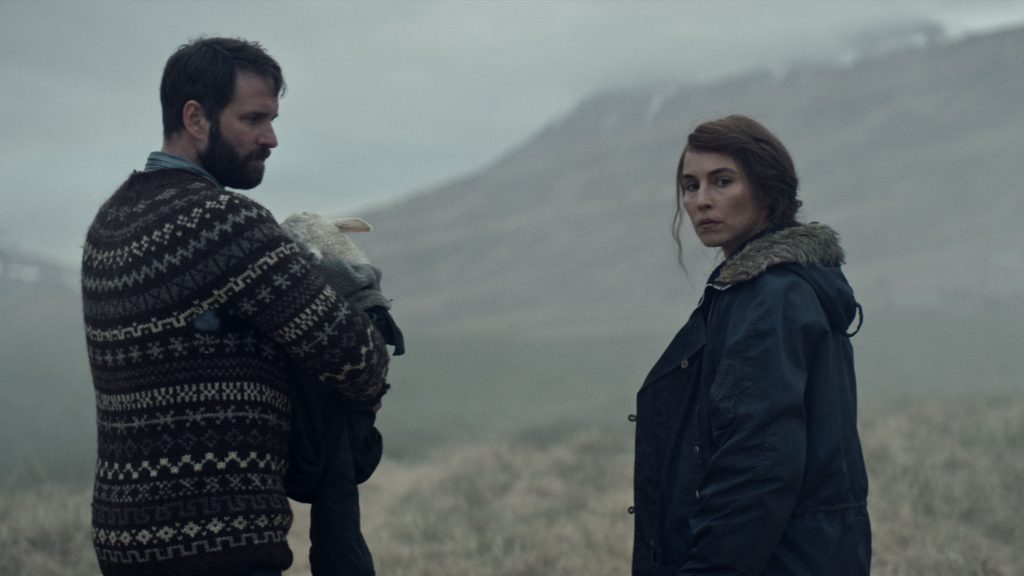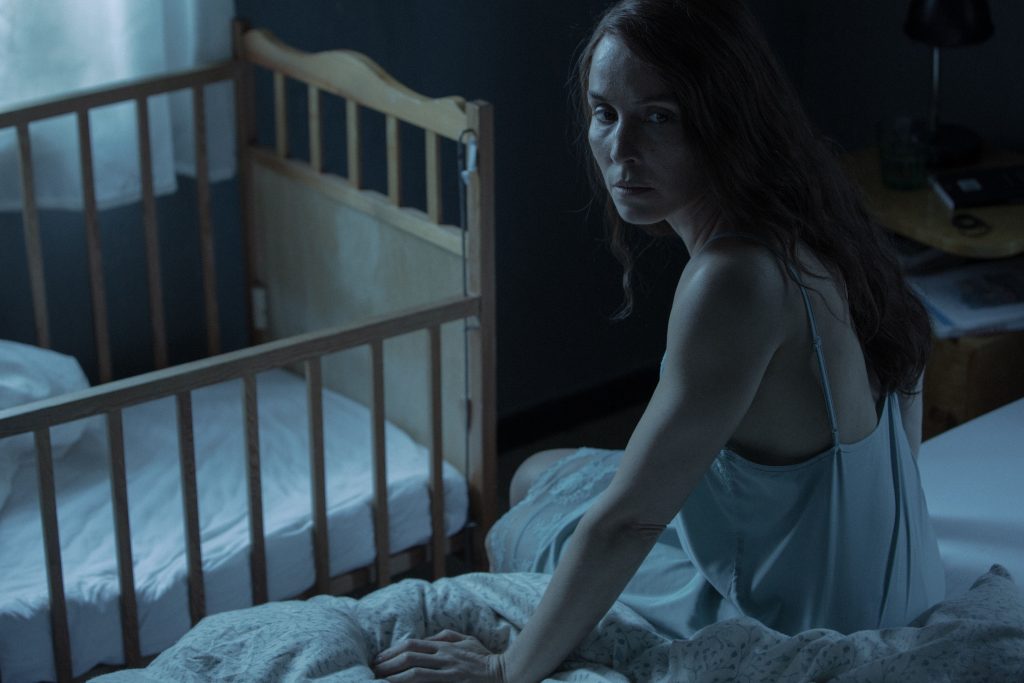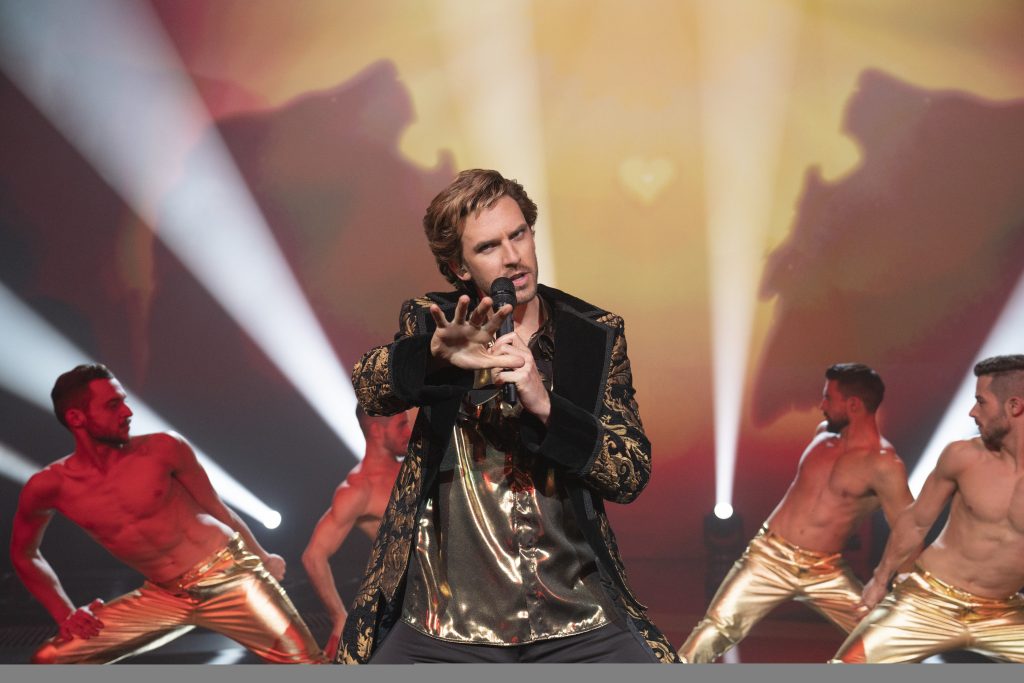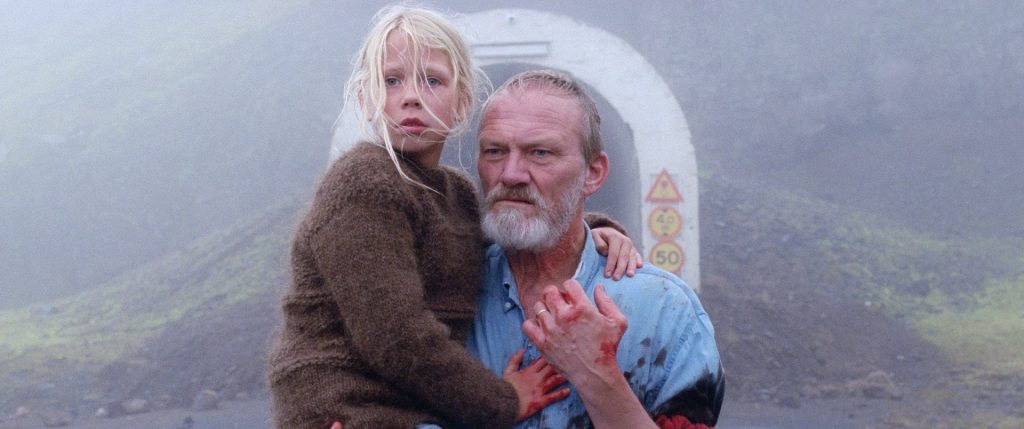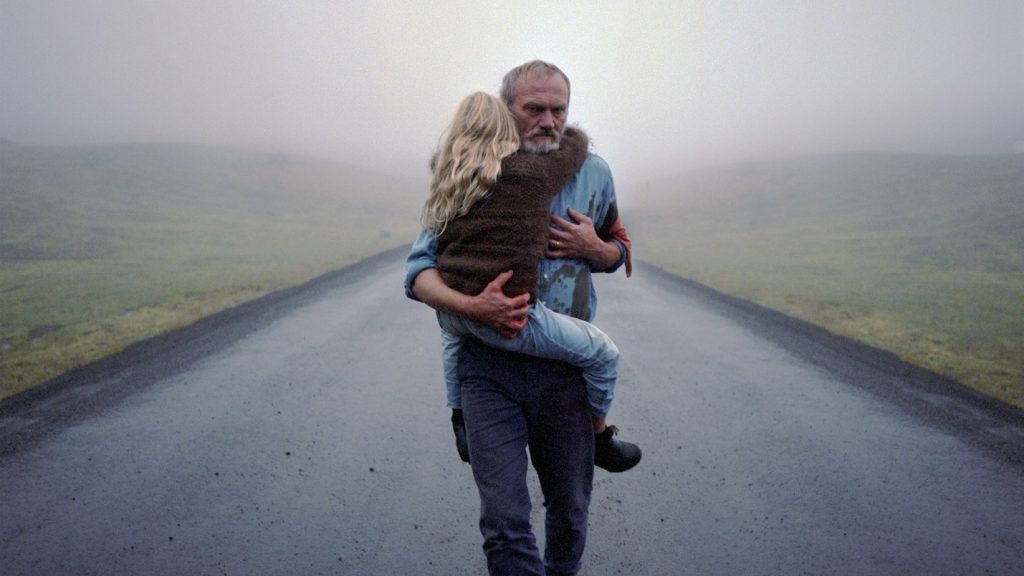July 14, 2024
by Carla Hay

Directed by Baltasar Kormákur
Some language in Japanese and Icelandic with subtitles
Culture Representation: Taking place in Iceland, the United Kingdom, and Japan in 2020, with flashbacks to 1969, the dramatic film “Touch” (based on the novel of the same name) features a white and Japanese cast of characters representing the working-class and middle-class.
Culture Clash: During the COVID-19 pandemic lockdowns of 2020, a widowed restaurateur from Iceland travels to the United Kingdom and Japan to search for the Japanese woman he fell in love with in London in 1969.
Culture Audience: “Touch” will appeal primarily to people who are are interested in well-acted dramas about love that transcends different cultures, races and nationalities.

“Touch” has beautifully moving performances in this memorable drama about a man searching for a long-lost love, 51 years after he last saw her. It’s a bittersweet romantic story that also has poignant observations of the traumatic damages caused by war. Although the story in the movie is fictional, many of the scenarios are very realistic, except for how the protagonist’s dementia is sidelined and ignored for almost the entire movie.
Directed by Baltasar Kormákur, “Touch” is based on Ólafur Jóhann Ólafsson’s 2022 novel of the same name. Kormákur and Ólafsson co-wrote the movie’s adapted screenplay. “Touch” was filmed on location in Iceland, the United Kingdom, and Japan—the three countries where the movie’s story takes place. The movie has a lot of abrupt timeline jumping between 2020 and 1969. Some viewers might not like that the timeline constantly goes back and forth between these two years, but this narrative structure increases the suspense of what will happen.
“Touch” begins in early 2020, at the beginning of the COVID-19 pandemic lockdowns. Kristófer Hannesson (played by Egill Ólafsson), an Icelandic widower in his 70s, is a restaurateur in Reykjavík, Iceland. He is shown looking at boxes of mementos, mostly from his college-age years, when he used to live in London. Kristófer has recently shut down his restaurant because of the COVID-19 pandemic. Certain travel borders will soon be closed because of the pandemic.
It’s soon revealed that Kristófer has been diagnosed with early-stages dementia after his MRI test results have been evaluated. Kristófer says he has vivid memories of things that happened in the past but he sometimes forgets to do simple things such as tie shoelaces. After Kristófer gets this dementia diagnosis, Kristófer’s physician Dr. Stefansson (played by Benedikt Erlingsson) advises him to take care of any unfinished business.
Kristófer looks at a photo of his deceased wife Inga (played by María Ellingsen) and says, “Forgive me.” He then tells his daughter Sonja (voiced by Harpa Elísa Þórsdóttir) in a phone conversation that he’s going to London to look for a missing person he once knew. Sonja is never seen in the movie, but she continues to have phone conversations with Kristófer during his travels. Sonja grows increasingly worried that Kristófer is going to different countries during the pandemic and won’t tell her the details of why this search so urgent for him.
The movie reveals very little about what Kristófer’s life has been like as a family man. There is one flashback scene that shows elderly Kristófer and Inga during a marriage counseling session, which is an indication that they had serious problems in their marriage. The movie doesn’t show or tell what those problems were.
It’s mentioned during this session that Sonja is not Kristófer’s biological child because Sonja is Inga’s daughter from a previous marriage or previous relationship. Kristófer and Sonja decided not to biological children of their own. Inga got married to Kristófer when Sonja was very young. It’s implied that Kristófer adopted Sonja after he and Inga got married.
As already shown in the “Touch” trailer, Kristófer has gone to London because he is looking for the woman he fell in love with in London in 1969. Flashbacks show that in 1969, Kristófer (played by Palmi Kormákur, a son of “Touch” director Baltasar Kormákur) was a London School of Economics (LSE) student who participated in left-wing activist protests. His two closest friends at LSE are also fellow Icelanders: Jónas (played by Sigurður Ingvarsson) and Markús (played by Starkaður Pétursson), who share his political interests.
Kristófer doesn’t consider himself to be a socialist but more like an “anarchist,” he says in a half-joking tone later in the movie. And even though he participates in student protests, Kristófer actually has an introverted personality. An early scene in the movie shows that other student activists look up to him as a leader, but he is reluctant to be the center of attention in a leadership role. In his free time, Kristófer likes to spend time by himself reading and listening to music.
Kristófer drops out of LSE because he “lost interest” in university studies, but he still wants to live in London. Nothing is revealed about Kristófer’s family and what they thought of him dropping out of LSE. Kristófer doesn’t discuss his background in detail in this movie. He is not shown communicating with anyone in Iceland while he is in London. However, he mentions during a restaurant job interview that he grew up in smaller cities in Iceland where he did a lot of fishing.
One day, while hanging out with Jónas and Markús, Kristófer sees a “help wanted” sign at a Japanese restaurant called Nippon. The job opening is a dishwasher position. Kristófer speaks to Nippon’s owner/manager is a widower named Takahashi-san (played by Masahiro Motoki) that he’s interested in the job. Takahashi-san is skeptical about Kristófer’s interest in working at a Japanese restaurant and tells Kristófer that this dishwasher job is full-time. Kristófer assures him that he can work these hours, so Takahashi-san tells him to come back the next day for a job interview.
As Kristófer is leaving, a pretty woman who’s about the same age as Kristófer walks through the front door. They look at each other in a way that people do in movies where you know they these two people will end up falling in love. Kristófer doesn’t know it yet, but the woman’s name is Miko (played Kōki), and she is Takahashi-san’s daughter and only child. Miko is a student at an unnamed university, and she works on weekends at Nippon.
The job interview that Kristófer has with Takahashi-san starts off awkwardly until Kristófer mentions he comes from a fishing village. It’s something that Kristófer and Takahashi-san have in common. Takahashi-san is also an immigrant living in London. Takahashi-san says he moved and Miko moved from Japan to London in 1957.
Takahashi-san is impressed with Kristófer’s knowledge of all types of fish. Takahashi-san mentions that the dishwasher job will also entail helping out doing some cooking kitchen. Kristófer says he’s eager to do it, and he gets the job.
Kristófer is a quick learner and shows great respect for Japanese culture and cuisine. He decides to learn Japanese. After Kristófer find out who Miko is, they mildly flirt with each other but he keeps a polite distance, even though they obviously feel attracted to each other. Kristófer also gets along with his Nippon co-workers. In particular, he has a very friendly rapport with a middle-aged waitress named Hitomi (played by Meg Kubota), who treats him a little bit like a younger brother.
The first time that Kristófer and Miko have a conversation, they’re in the back room of Nippon. The Plastic Ono Band anti-war song “Give Peace a Chance” (written and sung by John Lennon) is playing in the background, Miko says to Kristófer that he reminds her of Lennon—and it’s not just because Kristófer has dark hair, a beard and wears round glasses like Lennon. Miko is often coy when talking to Kristófer and sometimes she is very direct in asking him personal questions.
Kristófer’s hopes of getting closer to Miko are temporarily dashed when she introduces him to her boyfriend Naruki (played by Masaya Mimura), who looks like he’ about five to eight years older than Miko. Kristófer is polite to Naruki but deep down, Kristófer is disappointed that Miko already has a boyfriend. It’s later shown in the movie how romance develops between Kristófer and Miko and what eventually happened to Naruki.
The love story is the obvious center of “Touch,” but the movie also has empathetic portrayals of the generational traumas caused by the World War II atomic bombings in Japan, specifically in Hiroshima. Kristófer also sees firsthand that racism against Japanese people is a lot closer to him than he thought it was, when Jónas and Markús visit Nippon as customers and make racist remarks about Japanese people in front of the employees.
In order for a movie like “Touch” to have its greatest emotional impact, the love story between Kristófer and Miko has to be convincing. Fortunately, Pálmi Kormákur and Kōki give very good performances that will make viewers root for this couple who quickly fall in love but also keep their love affair hidden from Takahashi-san, for various reasons. Kristófer does not want their romance to be a secret, but Miko is very afraid of her father and other people in her Japanese community of find out this secret.
The trailer for “Touch” already reveals that in 1969, Kristófer was shocked to find out that Takahashi-san abruptly closed restaurant and left London with Miko, who never said goodbye or contacted Kristófer again. The Nippon employees were not given any information on where Takahashi-san and Miko went. A flashback in the movie shows that when Kristófer went to the apartment where Takahashi-san and Miko lived, no one there knew any information either.
Now that he is a widower, Kristófer wants to find out what happened to Miko and why she disappeared from his life so suddenly. The movie’s scenes that take place in 2020 consist of Kristófer getting clues and following those clues in his quest to find out what happened to Miko. The movie implies that Kristófer doesn’t know how to use the Internet because he uses other ways to get the information that he needs.
Ólafsson gives a very endearing performance as elderly Kristófer (who is still mild-mannered and gentle), but there are many unanswered questions about Kristófer by the time he goes on the search for Miko. It can be presumed that the filmmakers of “Touch” didn’t want to delve too much into elderly Kristófer’s life as a husband and father because it would perhaps take away from the intention for viewers to anticipate a reunion between Kristófer and Miko.
Aside from having big voids in Kristófer’s backstory from 1970 to 2020, it’s hard not to notice that Pálmi Kormákur is much taller (by about four or five inches) than Ólafsson. It’s somewhat distracting to see how much shorter elderly Kristófer is, compared to young Kristófer. (And it’s not because elderly Kristófer walks hunched over.)
This disparity in physical height is not nearly as problematic as how the “Touch” movie makes a point of mentioning in the beginning that elderly Kristófer has dementia, but then the dementia is never shown for the rest of the movie. It didn’t need to be a dementia sob story, but a little more realism would’ve helped in showing that elderly Kristófer has this serious disease and why he feels like his time is running out to find Miko. During the entire time that he looks for Miko, elderly Kristófer’s mental and cognitive abilities seem perfectly fine, with no signs of memory loss, as if his dementia magically disappeared.
Although “Touch” bungles the accuracy in portraying someone with dementia, the movie excels in the emotional aspects of this story. Of course, there are twists and turns in the search for Miko. “Touch” is very effective in showing that this search isn’t about nostalgia but it’s about reconnecting with a loved one and sharing the parts of yourself that never went away.
Focus Features released “Touch” in select U.S. cinemas on July 12, 2024. The movie was released in Iceland on May 29, 2024.

